Wade Rain Poweroll
The Poweroll is a mechanized sprinkler irrigation system that takes the hard work out of moving sprinkler irrigation pipe, saving time, labor, and money.
Crops:
- Pasture

Pasture
Excellent for pasture applications - increases yield. - Hay

Hay
The Poweroll is excellent for hay. - Cereal Grains

Cereal Grains
Can be used on up to 50 acres of grans because of low water requirement. Big increase in yields. - Cotton

Cotton
Works on almost all cotton crops - depends on variety. - Potatoes

Potatoes
Very popular. Used all over world to grow potatoes for McDonalds' French fries. - Alfalfa

Alfalfa
Used on alfalfa for deep watering of alfalfa roots. Very popular application - Sugar Beets

Sugar Beets
Increases yields and produces high quality beets. - Soy Beans

Soy Beans
Popular application of Poweroll. - Carrots

Carrots
The Poweroll is excellent for carrots - Strawberries

Strawberries
The Poweroll is excellent for strawberries - Row Crops

Row Crops
Does a good job irrigating and is much less expensive than drip irrigation. - Vegetables

Vegetables
Does a good job irrigating and is much less expensive than drip irrigation. - Corn

Corn
The Poweroll is not recommended for corn.
Not Recommended - Sugar Cane

Sugar Cane
The Poweroll is not recommended for sugar cane.
Not Recommended - Orchards & Vineyards

Orchards & Vineyards
The Poweroll is not recommended for orchards or vineyards.
Not Recommended
Advantages:
- Labor saving device. Only takes 15 minutes to reset the system
- Proven concept- over 200,000 wheel line systems in use world wide
- Simple to operate and maintain
- Significantly lower cost per acre than tape or drip
- Semi-automatic system. One person can manage up to 15 lines
- Irrigates fields up to 20-50 acres (8-20 hectares) depending on crop, soil and water consumption, and frequency of moves
- Reduces crop damage from walking on crop
- Irrigates square and rectangular fields
- Irrigates in heavy soils where big guns and pivots fail
Disadvantages:
- Will not irrigate crops over 4 feet (1.22 meters) such as corn and sugar cane
- Requires light labor to move line
- Multiple systems required for very large fields
- Requires 40-50 PSI (2.75-3.5 bars) of water pressure
- High winds will distort irrigation pattern
Photo Gallery
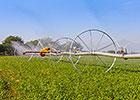
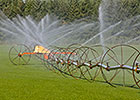

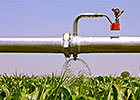

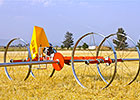
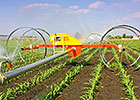

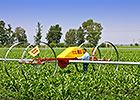
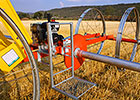
Operation
The Poweroll is an aluminum sprinkler line mounted on wheels which irrigates in place. A mover unit powered by a small gasoline engine is located in the center of the line. The sprinkler line is connected to a supply or mainline by a flexible hose.
When an irrigation run is completed (usually 8 to 12 hours), the operator turns the line off, carries the connector hose to the next operating position along the mainline, and then walks to the center of the line and starts the mover engine. Maintaining control with hydrostatic transmission, the operator rolls the entire line across the field to the next irrigating position, usually 60 feet. Then the operator returns to the mainline, reconnects the hose, and starts the next irrigation run. The whole moving procedure takes about 20 minutes of work.
When the Poweroll line has covered the entire field, the operator then reverses the line and travels back to the original starting point where the system is ready for the next irrigation cycle.
Questions & Answers
Click here for anwsers to the most frequently asked questions about the Poweroll.
System Pricing
See the Poweroll System Pricing page to calculate the price of a Poweroll system that is right for you.
Benefits of the Wade Rain Poweroll
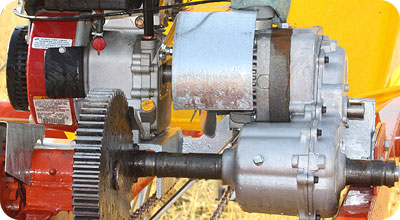
Hydrostatic Transmission
Hydrostatic transmission applies the amount of torque needed to move the load. The operator regulates speed and power to fit the load and contour of the land, maintaining far better control and delivering more working horsepowerthan is possible with hydraulic units.
Wade Rain Hydrostatic Transmission gives you smooth speed changes -from full forward through zero to full reverse- all with a single control. Pick your speed from less than one foot per minute to 65 feet per minute.
Dual Rail Frame
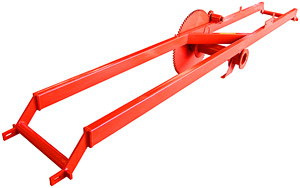
The Wade Rain Poweroll mover unit combines Hydrostatic Transmission with a dual-rail frame over a 14-foot wheel base to enable you to pull out of the mud and wet ground with full power at a slower speed, and then adjust to high speed on dry ground.
The longer frame gives you more power, through increased leverage, to roll the line and keep the mover unit up with the line. The extra long dual-frame of Wade Rain's Poweroll mover has two lock bearings for each tail wheel axle, to assure easy alignment and better tracking. Reduces crop damage and labor.
Double Draining Couplers
Wade Rain Poweroll comes with double-draining couplers. Double-draining couplers drain both from the coupler gasket and from the drain valve. This means your wheeline will drain quickly and completely, so that you can move your wheeline to its next position. A typical wheeline with 4 inch pipe takes 8 1/2 minutes to drain while a 5 inch wheeline takes 15 minutes.
Automatically self-draining, the couplers seal when water pressure is turned on and drain when water pressure is turned off. The couplers will not leak due to misalignment of the line, and do not rely on a mechanically compressed gasket. A large drain opening provides fast draining and extra clearance for removal of material clogging the line.
Poweroll gives you double draining all the way around so that the line drains through the gasket 360 degrees and in any position quickly and completely. This means your wheeline will still drain fast even if it is misaligned and the drain valves aren't facing the ground.
Deep Groove Wheels

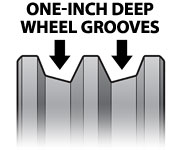
Strong rims with deep corrugations give greater strength with lighter weight. The construction design helps the wheel resist denting in rocky soil or twisting out of shape when axial loads are applied, preventing flattening between the spokes, collapsing or figure-eighting.
Easy Installation
Poweroll is designed to be simple to operate and maintain. It is also simple to install. No special tools or equipment such as a boom truck are required, meaning that Poweroll can be located in rural areas where minimal infrastructure is needed for successful operation.
